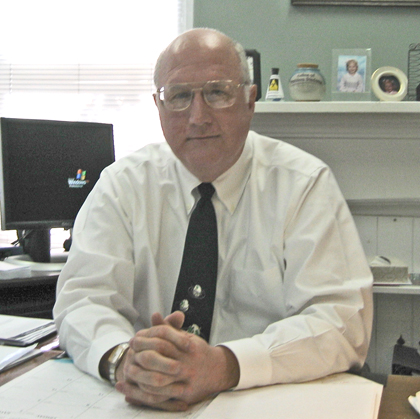
|
|
Vol. LXII, No. 11
|
|
Wednesday, March 12, 2008
|

|
|
Vol. LXII, No. 11
|
|
Wednesday, March 12, 2008
|
 (Photo by Ellen Gilbert)
“I will really miss working with the students. I will miss teaching the eighth-grade science class. I really love that.”
— Charles Marsee, on retiring as Head of the Princeton Charter School |
Charles Marsee was remembering the early meetings with parents, over eleven years ago, that led to him being hired as Head of the Princeton Charter School (PCS). The school, it should be pointed out, did not exist at the time. “They had no money,” he recalled. “They had no building. They had no faculty. There was only an outline of a curriculum.” It was March, and they wanted school to start in September. He took the job.
“I was impressed with the people that I met,” said Mr. Marsee and they, apparently, felt the same way about him. Although he interviewed with thoughts of teaching chemistry at the new school, they wanted him to be Head of School.
The rest, as they say, is history. PCS, which started out in the fall of 1997 with 72 students in grades 4 through 6, now serves 298 children in grades K through 8. The accolades keep coming. In 2002, PCS became the first charter school in the nation to receive accreditation from the American Academy for Liberal Education (AALE). In awarding PCS accreditation, Jeffery Wallin, the President of the American Academy for Liberal Education congratulated PCS on its “manifest commitment to an academically demanding program” and stated that the school has achieved “the highest standards we are aware of in the whole realm of K-12 education.” In 2004, United States Secretary of Education Rod Paige named PCS a “No Child Left Behind Blue Ribbon School,” recognizing it as a national model of excellence. That same year it was named “Charter School of Distinction” by the New Jersey Department of Education for its outstanding record of performance “as measured by high student achievement and school accomplishments, exemplary teaching practices, effective and efficient administrative leadership, and solid governance.” In 2007 PCS was named a “National Charter School of the Year” by the Center for Education Reform.
A Record of Achievement
Thinking back on the highlights of his years at PCS, Mr. Marsee cites the moment in the school’s second year “when we received the results of the writing sample from ERB [Educational Records Bureau], and saw the progress that students had made from the year before.” Student performance on the GEPA (Grade Eight Proficiency Test) has also been particularly noteworthy, with PCS students obtaining the highest scores across the state in advanced science and math proficiency for five years in a row. PCS has been recognized numerous times as a Benchmark School for attaining high rates of student achievement on New Jersey’s state assessment tests. “If you’re not getting better, you’re getting worse,” Mr. Marsee said of the school’s continued successes.
Sitting in his office surrounded by plaques attesting to the school’s top-notch performance (not to mention an urn labeled “Ashes of Problem Students” strategically placed on a nearby shelf), Mr. Marsee candidly admits that “I didn’t know anything about charter schools” when he first came to Princeton. Previously, he had headed a day school and a girl’s boarding school, and had never lived on the East coast. “There are not many times when you get to work with a school from scratch, though” he observed. “I have always been an optimist. From the get-go I assumed it would work.” He was not surprised by the school’s proficiency in teaching science and math, but he had not anticipated that it would turn out to have a first-class world language program as well.
A Necessary “Field Trip”
It was, to be sure, a challenge. Mr. Marsee recalled, for example, the early days when the school’s main building on Bunn Drive was not yet ready. Five teachers (four of them are still with the school, along with 19 other full-time and four part-timers) had been meeting with students at the Nassau Presbyterian Church, but there came the day when they “had a school with no building. I don’t know if the Board of Education knew about that,” chuckled Mr. Marsee. With the church space no longer available, they assembled in the church parking lot and boarded buses for “an all-school field trip to Philadelphia.”
What Next?
After 43 years as an educator, what does Mr. Marsee plan to do as he retires? “People keep asking me that,” he mused. His wife, Jerri, is a tenured associate professor at Union City College and will continue working, so the Marsees will remain in the area at least for a while. Mr. Marsee said that he plans to travel, play golf, and “spoil a few grandchildren,” at first. After a year of “doing very little,” he looks forward to getting back to the volunteer work he largely gave up when he became head of Princeton Charter School.